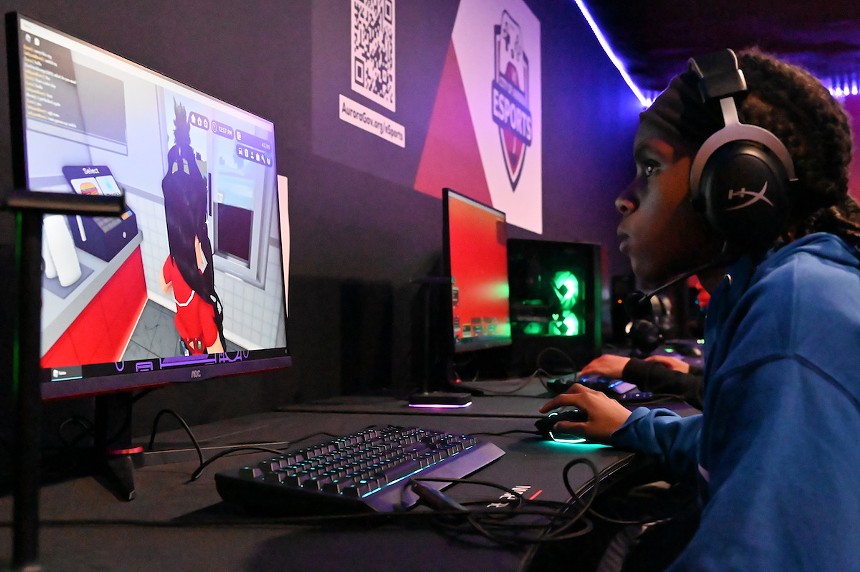Recognizing the industry as a legitimate future form of competitive sports, Aurora has launched its very own esports program that it hopes to one day expand with the help of nearby high schools. The eight-month-old program is housed in a small space at the back of the Expo Recreation Center at Exposition Park, across from Highline Community Elementary School, near South Havana Street and East Mississippi Avenue.
“It’s a big vision by Aurora,” says Adam Hamm, a recreation specialist for the city who is leading the program’s growth. “I just brought up the idea of esports and how it’s surging, and I think the idea really took hold once I started talking about it as an investment in the community.”
“I knew, having kids myself, about the growing popularity of esports,” says Derrick Tripp, sports superintendent for the City of Aurora. “For a community the size we are and the diverse population we have, it seems like a winner.”
With an investment of about $25,000, Aurora’s Recreation and Sports Division started the program in October by buying the latest next-gen consoles — the Xbox Series X and PlayStation 5 — as well as a Nintendo Switch. The city also put in ten professional gaming computers, with games like Rocket League, League of Legends and Fortnite.
“I joined it because I really like playing video games, especially FIFA,” says Dylan Cotino, a sixth-grader, referring to the popular soccer game series. “I’m not playing video games after this at home. I get to spend time with my family at home. [My parents] really like it.”
“It’s a fun after-school activity to do,” adds eight-grader Amara Edwards. “It gives my parents some time to pick me up after school, so it’s a nice thing for kids to go to if their parents can’t pick them up right when school gets out.”
Another benefit that students point out is how the esports program gives kids a chance to play games that their families may not be able to afford.
“I got interested in this because you don’t usually get PCs and games like these at your house, because you don’t have enough to pay for that,” says one sixth-grader. “I’m having great fun here. It’s a good place.”
Currently, Aurora is the only city in Colorado with its own esports program, though two others are housed in parks and recreation districts. Still, with so few in existence, Aurora isn’t able to able to set up competitions between teams or individuals using their favorite video games. But Hamm hopes to see that someday down the road.
The esports community is popular around the world, but in Colorado, it’s recently gained legitimacy after the Colorado High School Activities Association — the same body that governs high schools sports around the state — began recognizing esports teams and competitions at state high schools.

Amara Edwards plays Bloxburg on the PC after school through the Aurora esports program.
Bennito L. Kelty
Rocky Mountain High School in Lakewood has an esports team that went undefeated in the classic animated racing game Mario Kart and beat Pueblo West a few weeks ago to win the state Mario Kart championship.
Outside of high schools, only two other esports programs exist in Colorado — putting Aurora a bit ahead of the curve. One is at the South Suburban Parks and Recreation District around the cities of Littleton and Centennial, and the other is at the Foothills Parks and Recreation District in Jefferson County.
Looking to put more of a competitive aspect into Aurora’s program, Hamm is working with CHSAA to partner with a local high school — either Gateway (Hamm’s alma mater) or Overland High School. Aurora is hoping to offer its space and equipment to help form the school’s esports team.
“I have big aspirations for the program,” Hamm says. “Esports isn’t going anywhere. It’s picking up.”
Only a few games are sanctioned by CHSAA for competition — including Rocket League, Mario Kart and League of Legends, which has two teams of five fantasy-like characters battling it out in an arena. Hamm wants that “game pool” to expand, and thinks it can with out-of-school esports programs.
The benefit of having an esports team housed with Aurora’s program is that it avoids the protective firewalls that public schools use to keep kids from misusing the internet. Those firewalls also keep students from accessing more than a few video games. Aurora’s program has a larger catalogue and offers games on consoles like PlayStation and Xbox, which don’t have firewalls.
“I don’t turn people away,” Hamm says. “We want them to enjoy the space.”
Another program that makes use of Aurora’s esports offerings is the COMPASS after-school program, which is run by both the city and Aurora Public Schools to place kids in extracurricular activities. COMPASS participants have access to the esports program every Thursday from 4:30 to 5:30 p.m.
Kids interested in joining Aurora’s esports program can schedule a sixty-to-ninety-minute session at any time from 3:30 to 7:30 p.m. Tuesday, Wednesdays and Fridays — or from 5:30 to 7:30 p.m. on Thursdays. The cost is $3 per session except on Fridays, when it’s free.
“The focus is more on community, but we still have to generate revenue,” Hamm notes. “The birthday parties and summer camps do that for us.”
Stay connected with us on social media platform for instant update click here to join our Twitter, & Facebook
We are now on Telegram. Click here to join our channel (@TechiUpdate) and stay updated with the latest Technology headlines.
For all the latest For Top Stories News Click Here
